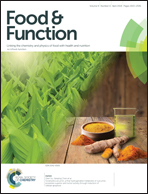Modulation of the bitterness of pea and potato proteins by a complex coacervation method
Abstract
The incorporation of novel plant-based proteins into foods is often challenging due to an unacceptable bitter sensation. Typically, a combination of electrostatic and hydrophobic forces contributes to the proteins’ bitterness. The current study therefore focuses on the development of electrical properties on cationic plant proteins to reduce their overall bitterness in order to improve the perceived sensorial acceptance. As such, we utilized a simple mixing process to induce complex coacervation of oppositely charged biopolymers under acidic conditions. Pea and potato protein stock solutions were mixed with apple pectin (DE 71%) solutions at various biopolymer ratios to modulate the electrical, rheological, and sensorial properties of the complexes. Whey protein hydrolyzate was used as a control sample. Surface charge measurements revealed a transition from positive to negative values as the pectin concentration was increased regardless of the plant protein, whereas stable dispersions without sedimentation were observed above a critical pectin : protein ratio of 1. Low and intermediate biopolymer ratios (<1) promoted aggregation and led to rapid sedimentation. Sensory evaluation showed that bitterness scores depended on protein type and decreased from pea protein > potato protein > whey protein. Moreover, bitter off-notes were increasingly reduced with increasing pectin : protein ratios; however, high dispersion viscosities above 0.05 Pa s led to undesirable texture and mouthfeel of the biopolymer dispersions. Our results might have important implications for the utilization of novel plant proteins in food and beverage applications.



 Please wait while we load your content...
Please wait while we load your content...